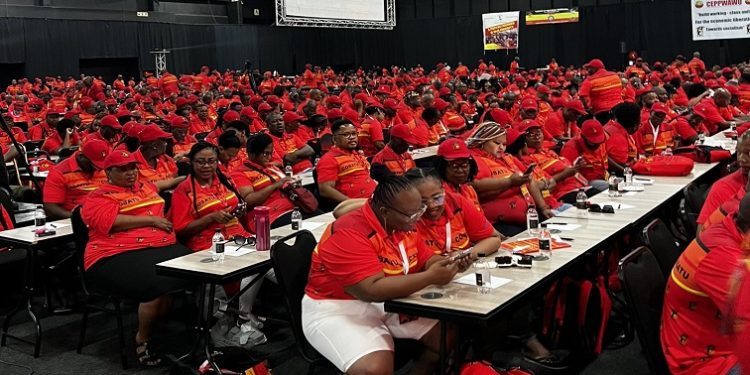The Zimbabwean Congress of Trade Unions (ZCTU) has painted a bleak picture about the state of economy in the neighbouring country.
Speaking on the sidelines of the COSATU Congress in Midrand, north of Johannesburg, Zimbabwean trade union leader Japhet Moyo says unemployment has reached 94 percent and labour movement within the continent and the world must find solutions.
The Zimbabwean economy is facing a myriad of challenges, from rising macroeconomic instability, uncertainty remains high and this has been exacerbated by COVID-19 pandemic.
ZCTU says it’s high time that labour movements use platforms like the COSATU Congress to find solutions.
“The congress or gathering is coming at the time when workers not in South Africa or the region, all over the world, are facing issues. We still have COVID-19 issues, energy crisis and war in Europe, this is an opportunity to reflect on the journey and look at issues and we are doing quite a lot as organised labour,” says Moyo.
Energy security is another critical issue as Zimbabwe and South Africa are battling to keep the lights on.
“I think we are also facing load shedding even in Zimbabwe, we haven’t seen how governments in the region are tackling the issue of energy. Once we have challenges of energy we are likely to see job losses and these are issues that politicians haven’t tackled in the way that is satisfying,” Moyo adds.
Other countries’ challenges
COSATU has also been a staunch supporter of the cause of people of the Kingdom of Eswatini.
“I think with us may be we are having a different problem, ours is the political problem and it requires political solution and us as labour we should advance democracy and other things can be discussed in a democratic arrangement,” says General Secretary of Trade Union Congress of Eswatini Mduduzi Gina.
In Kenya, just as President William Ruto has taken over labour movements, he wants his administration to tackle socio-economic challenges facing East Africa’s economic powerhouse.
“Quite a number of people lost jobs particularly in the hospitality and TV industry. We are remaining stable though, Kenyans are proactive, we are about to recover if the government implements and we will recover although I know it’s a tall order,” says Kenyan trade unionist Benson Okwaro.
Inflation remains a huge concern in Ghana.
“We don’t have food crisis in Ghana but the inflation is going up and you have commodities that are going up in the market. But for food we don’t have problem there but what we can do as Africans, we need to take advantage of the African Continental Free [Trade] Zone and the head office is in Ghana and it’s operating,” says Ghana TUC’s Alexander Nyarko Opoku.
And some international guests are quite optimistic in finding solutions to deal with job losses.
“That’s our job as a trade union, we must find solutions for our members in this moment where we have so many people out of work where the poor and working class are crashed by inflation and rising prices and we are still trying to recover from the pandemic. We must find solutions as a democratic movement,” says Just Transition Centre’s Samantha Smith from Norway.
One of the major challenges that trade union leaders have raised is around energy security especially in Southern Africa, they have called on the leaders to prioritise the issue to prioritize to avoid job losses.






